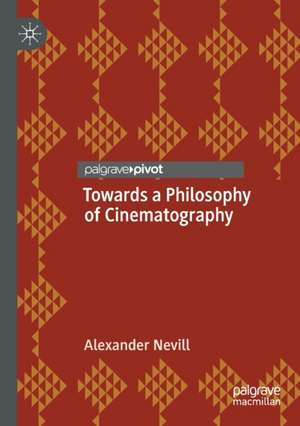Towards a Philosophy of Cinematography
Autor Alexander Nevillen Limba Engleză Paperback – 3 iun 2022
| Toate formatele și edițiile | Preț | Express |
|---|---|---|
| Paperback (1) | 461.40 lei 6-8 săpt. | |
| Springer International Publishing – 3 iun 2022 | 461.40 lei 6-8 săpt. | |
| Hardback (1) | 472.36 lei 6-8 săpt. | |
| Springer International Publishing – 2 iun 2021 | 472.36 lei 6-8 săpt. |
Preț: 461.40 lei
Preț vechi: 542.83 lei
-15% Nou
Puncte Express: 692
Preț estimativ în valută:
88.29€ • 94.41$ • 73.61£
88.29€ • 94.41$ • 73.61£
Carte tipărită la comandă
Livrare economică 17 aprilie-01 mai
Preluare comenzi: 021 569.72.76
Specificații
ISBN-13: 9783030659370
ISBN-10: 3030659372
Pagini: 90
Ilustrații: XI, 90 p.
Dimensiuni: 148 x 210 x 15 mm
Greutate: 0.15 kg
Ediția:1st ed. 2021
Editura: Springer International Publishing
Colecția Palgrave Macmillan
Locul publicării:Cham, Switzerland
ISBN-10: 3030659372
Pagini: 90
Ilustrații: XI, 90 p.
Dimensiuni: 148 x 210 x 15 mm
Greutate: 0.15 kg
Ediția:1st ed. 2021
Editura: Springer International Publishing
Colecția Palgrave Macmillan
Locul publicării:Cham, Switzerland
Cuprins
Preface.- Introduction.- Exploring Cinematography.- The Impact of Digitality.- Chapter 1: A Brief Philosophy of Light.- Chapter 2: Sculpting Light.- Chapter 3: Understanding Cinematography Technology.- Chapter 4: Exposure Processes.- Conclusion.
Notă biografică
Alexander Nevill is a cinematographer, filmmaker and Assistant Professor in the School of Cinema at San Francisco State University, USA.
Textul de pe ultima copertă
This book presents three interrelated essays about cinematography which offer a theoretical understanding of the ways that film practitioners orchestrate light in today’s post-digital context. Cinematography is a practice at the heart of film production which traditionally involves the control of light and camera technologies to creatively capture moving imagery. During recent years, the widespread adoption of digital processes in cinematography has received a good deal of critical attention from practitioners and scholars alike, however little specific consideration about evolving lighting practices can be found amongst this discourse. Drawing on new-materialist ideas, actor-network theory and the concept of co-creativity, these essays examine the impact of changing production processes for the role and responsibilities of a cinematographer with a specific focus on lighting. Each essay advances a new conceptual perspective on the discipline, moving from the notion of light as vision to light as material, from technology as a tool to technology as a network, and from cinematography as an industry to cinematography as a collaborative art.
Caracteristici
Examines the changing responsibilities of contemporary cinematography practitioners, suggesting that notions of co-creativity and aesthetic leadership can help the role to maintain relevance in an era of rapidly changing technologies Outlines lighting in moving image practices through a relational, new-materialist perspective which foregrounds the flow and energy of light as a generative force and a cultural and creative process Investigates the relationship between a cinematographer and their equipment by applying the actor-network framework to the consideration of moving image, and explicitly lighting technologies
